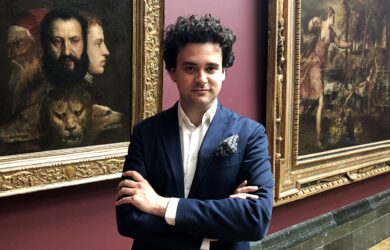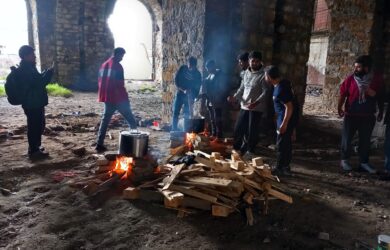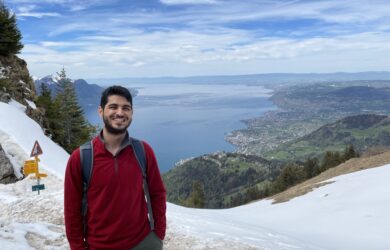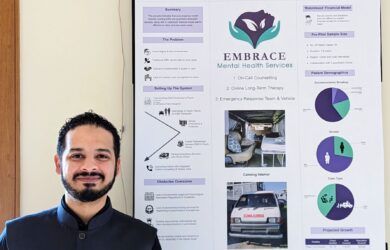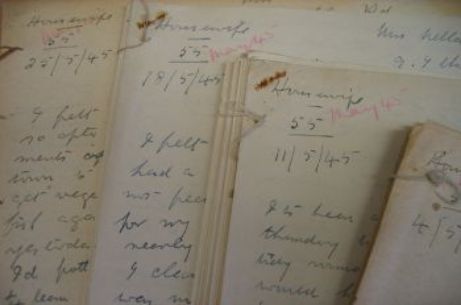
Rachel Bolten's MPhil will focus on the British Mass Observation study.
Rachel Bolten is fascinated by the crossover between politics, literature and history. It is that fascination which will bring her to the University of Cambridge this autumn to study the British Mass Observation Study, an ongoing oral history archive started during World War II.
It provides a “compelling analog” to Rachel’s undergraduate thesis on the American Guide Series, which were begun during the Depression and involved unemployed people across the US writing about where they lived.
Rachel believes that both projects are valuable resources for historians. “There is a power in asking people to consciously reflect through the act of writing about what it means to live in a certain place at a certain historical moment,” she says.
Born in Atherton, San Francisco, Rachel embraced literature at an early age and was fascinated as a child by the intersection between literature and history.
At her all girls high school she was very involved in the student council, edited the student newspaper and wrote for a political magazine about wider political issues and debates.
Outside of school life, she became involved in 826 Valencia, a national non-profit organisation which ran writing classes taught by established writers. She would meet every week with members of the group to discuss contributions to an anthology.
At Princeton she took English and American Studies. The American Studies course was interdisciplinary, covering history, politics and literature. “It shaped how I wanted to write and what I wanted to write about,” she says. She was drawn to the 1930s and studied artworks as well as transcripts of President Roosevelt’s speeches and political manifestos.
In addition to her academic work she took part in fiction workshops. Many of the members of faculty were established writers, like Joyce Carol Oates.
Rachel also wrote and edited Green Light, a college magazine, and wrote sketches and lyrics for a student musical theatre company.
Early on in her studies, she attended a seminar where reference was made to the American Guide Series produced by the Depression-era Federal Writers’ Project. It involved seven thousand unemployed men and women – among them future-famous writers like Zora Neale Hurston and John Cheever – who were set to work creating guidebooks to their home states and cities.
The project piqued her interest. A year later, when she was starting to think about her undergraduate research thesis it was still on her mind and she chose to focus on it. “The 1930s was a very exciting period in terms of the political conversations that were happening and the art that was being produced,” she says. “Artists were very self-consciously political. The Guide Series was enmeshed with governmental ideas about the shaping of the American national identity. It contained a lot of primary source material which was fascinating.”
Rachel’s interest in America’s cultural history continued when, after graduating from Princeton, she moved to New York and worked on a variety of publications, including a food blog called Serious Eats. The blog reviews every kind of food from new restaurants opening in NewYork to hot dog stands around the country. “It is interested in US food culture at all levels,” she says.
She was also an intern at the Nation where she was a fact checker. At the time, she says, she was missing research and the work helped satisfy her thirst for knowledge. It also involved talking to some of the US’ top writers to retrace how they had structured their articles and sharing the writing process to some degree. She says it helped improve her own writing and she was able to contribute some short articles.
At Cambridge she will do an MPhil in English Studies and will study an oral history archive in the UK, the British Mass Observation Study, which she says is “a compelling analog” to the American Guide. “Both were begun in periods of crisis – the Depression and World War II – and can be read as works of national literary auto-portrait,” she says. “Mass Observation recruited everyday citizens to keep diaries in order to create an ‘anthropology of ourselves’. But where the Guide project ended with the 1930s, Mass Observation continues today – the written reflections of contemporary Brits are kept in an ever-growing archive at the University of Sussex.”
Rachel continues: “The idea underlying the American Guides was to produce a vast guide to the US that was created by Americans to help them reflect and understand the place where they lived. That tension is also there in the Mass Observation Study.
“In writing about Mass Observation, I’m excited to continue to explore the interrelationship between literary production and citizenship, and the intersection of politics with democracy and art.”
Rachel hopes to continue her academic studies after her MPhil and plans to write her research “with an eye to something broader”. “I think there can be a lot of crossover between journalistic and academic writing,” she says.
Picture credit: University of Sussex, British Mass Observation Study








